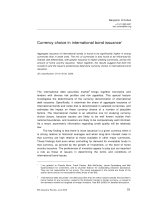Differences in culture in international business
Bạn đang xem bản rút gọn của tài liệu. Xem và tải ngay bản đầy đủ của tài liệu tại đây (409.54 KB, 40 trang )
International Business 7e
by Charles W.L. Hill
McGraw-Hill/Irwin Copyright © 2009 by The McGraw-Hill Companies, Inc. All rights reserved.
Chapter 3
Differences in Culture
3-3
Introduction
Successful international managers need cross-cultural
literacy - an understanding of how cultural differences
across and within nations can affect the way in which
business is practiced
A relationship may exist between culture and the costs of
doing business in a country or region
3-4
What Is Culture?
Culture is a system of values and norms that are shared
among a group of people and that when taken together
constitute a design for living
where
-values are abstract ideas about what a group believes to
be good, right, and desirable
-norms are the social rules and guidelines that prescribe
appropriate behavior in particular situations
Society refers to a group of people who share a common
set of values and norms
3-5
Values And Norms
Values provide the context within which a society’s norms
are established and justified and form the bedrock of a
culture
Norms include folkways (the routine conventions of
everyday life) and mores (norms that are seen as central to
the functioning of a society and to its social life)
3-6
Classroom Performance System
Abstract ideas about what a group believes to be good,
right, and desirable are called
a) norms
b) values
c) folkways
d) mores
3-7
Culture, Society, And The Nation-state
There is not a strict one-to-one relationship between a
society and a nation state
Nation-states are political creations that can contain one
or more cultures
Similarly, a culture can embrace several nations
3-8
The Determinants Of Culture
The values and norms of a culture are the evolutionary
product of a number of factors at work in a society including
religion, political and economic philosophies, education,
language, and social structure
3-9
Social Structure
Social structure refers to a society’s basic social
organization
Two dimensions to consider:
the degree to which the basic unit of social organization
is the individual, as opposed to the group
the degree to which a society is stratified into classes or
castes
3-10
Classroom Performance System
The basic social organization of a society is its
a) culture
b) social strata
c) social structure
d) caste system
3-11
Individuals And Groups
A group is an association of two or more people who
have a shared sense of identity and who interact with each
other in structured ways on the basis of a common set of
expectations about each other’s behavior
Societies differ in terms of the degree to which the group
is viewed as the primary means of social organization
3-12
Individuals And Groups
In many Western societies, there is a focus on the
individual, and individual achievement is common
This contributes to the dynamism of the US economy,
and high level of entrepreneurship
But, leads to a lack of company loyalty and failure to gain
company specific knowledge, competition between
individuals in a company instead of than team building, and
less ability to develop a strong network of contacts within a
firm
3-13
Individuals And Groups
In many Asian societies, the group is the primary unit of
social organization
This may discourage job switching between firms,
encourage lifetime employment systems, and lead to
cooperation in solving business problems
But, might also suppress individual creativity and initiative
3-14
Classroom Performance System
The group is the primary unit of social organization in
a) Japan
b) the United States
c) Switzerland
d) Mexico
3-15
Classroom Performance System
Which of the following is not characteristic of individualism?
a) individual achievement
b) low managerial mobility
c) low company loyalty
d) entrepreneurial behavior
3-16
Social Stratification
All societies are stratified on a hierarchical basis into
social categories, or social strata
While all societies are stratified to some extent, they differ
by:
the degree of mobility between social strata
the significance attached to social strata in business
contacts
3-17
Social Stratification
Social mobility is the extent to which individuals can
move out of the strata into which they are born
A caste system is a closed system of stratification in
which social position is determined by the family into which
a person is born, and change in that position is usually not
possible during an individual's lifetime
A class system is a form of open social stratification in
which the position a person has by birth can be changed
through his or her achievement or luck
3-18
Social Stratification
The social stratification of a society is significant if it
affects the operation of business organizations
Class consciousness is a condition where people tend to
perceive themselves in terms of their class background,
and this shapes their relationships with others
In cultures where class consciousness is high, the way
individuals from different classes work together may be
very prescribed and strained
3-19
Religious And Ethical Systems
Religion is a system of shared beliefs and rituals that are
concerned with the realm of the sacred
Ethical systems are a set of moral principles, or values,
that are used to guide and shape behavior
Religion and ethics are often closely intertwined
Four religions dominate society -Christianity, Islam,
Hinduism, and Buddhism
Confucianism is also important in influencing behavior
and culture in many parts of Asia
3-20
Religious And Ethical Systems
Map 3.1 World Religions
3-21
Christianity
Christianity is the world’s largest religion and is found
throughout Europe, the Americas, and other countries
settled by Europeans
Perhaps the most important economic implication of
Christianity is the Protestant work ethic
In 1804, Max Weber suggested that it was this ethic and
its focus on hard work, wealth creation, and frugality, that
was the driving force of capitalism
3-22
Islam
Islam, the world’s second largest religion, extends the underlying
roots of Christianity to an all-embracing way of life that governs one's
being
In the West, Islamic fundamentalism is associated in the media with
militants, terrorists, and violent upheavals, but in fact Islam teaches
peace, justice, and tolerance
Fundamentalists, who demand rigid commitment to religious beliefs
and rituals, have gained political power in many Muslim countries, and
blame the West for many social problems
The key economic implication of Islam is that under Islam, people do
not own property, but only act as stewards for God and thus must take
care of that which they have been entrusted with, so while Islam is
supportive of business, the way business is practiced is prescribed
3-23
Hinduism
Hinduism, practiced primarily on the Indian sub-continent,
focuses on the importance of achieving spiritual growth and
development, which may require material and physical self-
denial
Since Hindus are valued by their spiritual rather than
material achievements, there is not the same work ethic or
focus on entrepreneurship found in some other religions
Promotion and adding new responsibilities may not be
the goal of an employee, or may be infeasible due to the
employee's caste
3-24
Buddhism
Buddhism, which has about 350 millions followers,
stresses spiritual growth and the afterlife, rather than
achievement while in this world
Buddhism does emphasize wealth creation, and so
entrepreneurial behavior is not stressed
However, because Buddhism does not support the caste
system, individuals do have some mobility and can work
with individuals from different classes
3-25
Confucianism
Confucianism, an ideology practiced mainly in China,
teaches the importance of attaining personal salvation
through right action
High morals, ethical conduct, and loyalty to others is
central in Confucianism
Three key teachings of Confucianism - loyalty, reciprocal
obligations, and honesty - may all lead to a lowering of the
cost of doing business in Confucian societies









